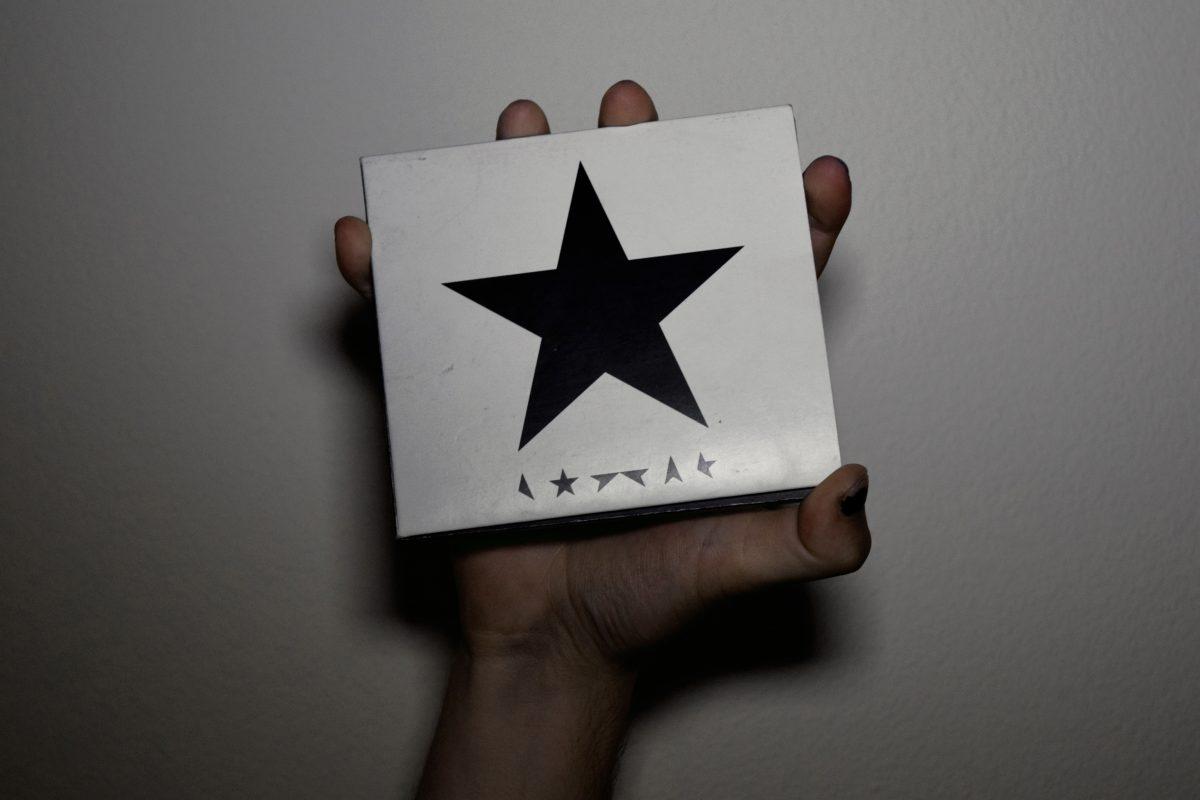Written by Marcus Cocova
The release of David Bowie’s final album ‘Blackstar’ and the legacy that he left on fans
The 26th addition to David Bowie’s discography was the well concealed album “Blackstar.” The date of the album’s release upon record store shelves Jan. 8 would also mark Bowie’s 69th birthday.
It was only two days later that the beloved multimusician, singer, songwriter and starman, after a rightfully unannounced 18 month battle with cancer, was pronounced dead.
His latest piece “Blackstar” came through the fog of misunderstanding and suddenly became very clear.
Aside from the two singles released f rom the album (“Blackstar” and “Lazarus”) as well as what had been shown in their partnered music videos, not very much had been shown or said about the album. This made the sounds of “Blackstar” almost as unexpected as Bowie’s death, especially with sound of his previous album “The Next Day,” which broke The Thin White Duke’s 10 year silence.
Having had a much more traditional Bowie-rock sound however, before the album’s release Bowie did cite his primary creative influences for the album’s sounds and styles as being both the experimental hip-hop group Death Grips as well as Kendrick Lamar’s 2015 album “To Pimp a Butterfly” which created expectations as far as what sort of textures the instruments of the album would provide.
When the album was released, the impacts of Lamar’s “To Pimp a Butterfly” could without a doubt be heard with musical components such as the amount of emphasis placed upon the varying styles of jazz that the cosmically haunting saxophone delivers, which acts somewhat like a guide or second narrator for listeners throughout the album, ushering them through the corridors of the “Blackstar” experience. The saxophone being Bowie’s first instrument gives this album a very full-circle effect.
The classic hip-hop style smoothness of some of the drum beats such as those heard in “Lazarus,” “Dollar Days” or “I Can’t Give Everything Away” also come across as though they’ve been inspired by Kendrick Lamar’s work and faultlessly set the stage for Bowie’s last, more spectral, scenes of his final act.
Meanwhile other tracks rage on with higher levels of intensity and sporadic panic behind the drumming such as what is heard in “Tis a Pity She Was a W****” or “Sue (Or In a Season of Crime)” both of which are unmistakably the discussed influence of Death Grips.
While many of the album’s unique properties come from the instrumentals which add to this grim celestial picture, its primary force and narrative lead painfully comes from Bowie himself.
For a majority of the album Bowie plays with his vocal age more than ever before, truly providing his closing set of songs with a distinctive accent.
The album’s title and introductory t rack quickly slam Bowie’s unbearable truth down on the table with the repeated declaration of “I’m a Blackstar!” When watching the music video, the inclusion of the visual component seems nearly imperative if one hopes to fully comprehend the distressing message that this courier carries with him.
At it’s introduction, the feeling is evoked that things are at some sort of apocalyptic minutes-till-midnight end with the audience being shown a mangled spacesuit containing a jewel encrusted skeleton, both of which could have belonged to none other than Bowie’s acclaimed fictitious portrait of bravery and at times his tool for introspection, Major Tom. Then it appears, the badge of end-times, the black star.
The video goes on to show Tom’s skeletal remains drifting into the same black sun that looms over this doom-laden planet. Bowie, alongside his own quietus offers the epilogue to what is now a trilogy which includes “Space Oddity,” “Ashes to Ashes” and finally “Blackstar.” With his own conclusive chapter, he gives fans the final tale of the Major.
The song takes its most interesting turn as it nears the four-minute mark when suddenly there is a complete change in vocal inflections and the pounding cry comes to a slow; the viewers are shown Bowie dressed in raggedy clothes being housed by a dilapidated attic. Bowie, out of what reads as desperation, clasps his hands together and reaches toward the sky almost as though to beg whoever may be listening or as a way of attempting to forcefully navigate the plot of the matters at hand into another direction with what can only be described as a monologue of sorts.
The repeated line suddenly begins to come back to haunt Bowie and soon after he breaks into a short series of silly faces and gestures exhibiting his reluctance to come to terms with the reality of affairs, Bowie hangs his head and melodically proclaims “I’m a blackstar” once more, but this time, it is delivered as a defeated acceptance of fate.
Over the course of the rest of the album, Bowie sustains the very same personal and social cognizance that he illustrates in the opening title track. Lines such as “Look up here I’m in heaven,” “Everybody knows me now” from “Lazarus” and “I’ve got no enemies” from “Dollar Days” make it very clear that he was aware of the magnitude of his accomplishments, his social stature and the number of reverberations his passing would cause.
Bowie even, by complete coincidence, wrote the chorus of the song “Girl Loves Me” as “Where the f*** did Monday go?” and he died on a Sunday. Although there was no way he could have known the exact day of the week his death would have landed on, this certainly adds that one final touch of the surreal otherworldly ambiance Bowie always carried.
Theafore mentioned hypothesis he had made about everyone knowing him would only come to be backed by fact. The day of his death as well as the day following consisted of global commemoration. That night, Bowie’s hometown of Brixton, South London exploded with lights, his music and fireworks all in remembrance of a life made worthwhile as a rock’n’roll star. Masses of flower bouquets were laid at both his final place of residence in New York as well as near his childhood home in front of a mural painted by street artist Jimmy C. Thousands of fans sprang up out of nowhere to come together in song and tribute.
The personal favorite songs of the album are incredibly difficult to select because “Blackstar” works so well as a whole to chronicle the thoughts and feelings of a dying Bowie. After a great deal of time spent in reverie and personal deliberation it comes down to the two songs which close out the album, “Dollar Days” and “I Can’t Give Everything Away.”
It must also be noted that from a conceptual standpoint the notion of “‘Tis a Pity She Was a W****,” “the w****” being death, makes the song worth much more than it initially is at face value and is worth honorable mention.
“Dollar Days” from the first listen was a song that silenced a room. Opening with the unpacking of what sounds to be a letter, a single bracing sigh from Bowie and finally cardiac monitor beeps, the song immediately colors you mind with hues similar to those in “Lazarus.” This ballad takes its time with each of its steps in eventually rising to be particularly beautiful.
The beginning of the actual melody featuring the silken guitar/saxophone duet sets the mood that matters are coming to their inevitable close. Bowie, soon after, states the line “If I never see the English evergreens I’m running to, it’s nothing to me, it’s nothing to see” which escorts this album to a very calm state in which Bowie speculates the possibility of an afterlife and its irrelevance, which we are left to assume comes from the satisfaction his celebrated life has granted him.
With the final track “I Can’t Give Everything Away,” Bowie seems to say that no matter how familiar or adjusted he has come to be with death and the ideas that passing on to whatever it is that comes next after the last months of his life, he simply cannot give his life away. Undoubtedly, this speaks to Bowie’s overall honesty within his artistry.
Despite all that has been said and felt throughout the album, Bowie still yearns for eagles in his daydreams and diamonds in his eyes. This song concludes the album with the message that no matter what, he could not be prepared to leave this life behind him.
To conclude, “Blackstar” is a sensational album. It is one that deserves to be just as eternal as the stars and the space they fill.
Bowie has touched upon his final months, a relatively rare knowledge to work with, combined with levels of care, brilliance, honesty and poise that many artists are simply incapable of achieving.
The grade of skill with a craft one must posses to paint an image like this, in the manner that Bowie has, is a thought that leaves one astonished by human potential. The way every instrument of the album is incorporated is ideal in setting the tone for topic. The way Bowie presents these concepts while staring death in the eyes is an act of honor that deserves the reverence it has received.
It is easily one of the best Bowie albums ever made and while unfortunate, it is the perfect final chapter to the epic melody that is Bowie’s music. A man who fell from the stars and made this world better with what he had to offer it. He will be remembered, he will be missed and he will be forever loved by the world over. Godspeed, Major Tom.













